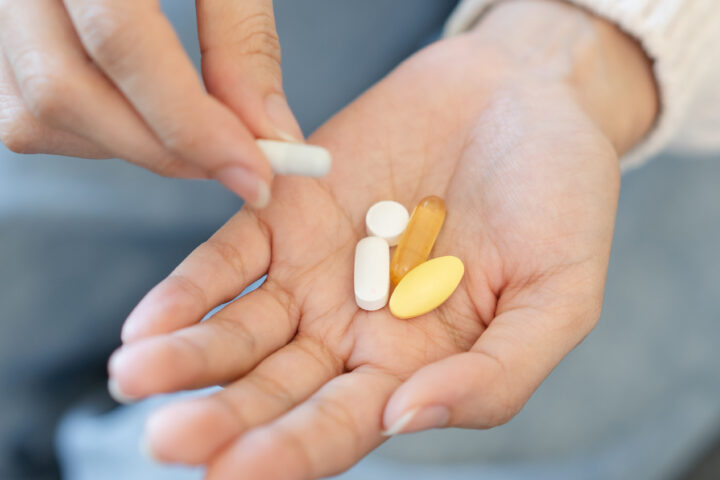«Is organic really healthier?»
Anna Bozzi is an analytical chemist. She heads the Nutrition and Agriculture division at scienceindustries. A balanced diet with a regular variety of fruits and vegetables is a crucial factor for a healthy lifestyle. However, whether the food comes from organic production is not decisive. Basically, all food is equally healthy (or unhealthy), she writes.
Monday, March 22, 2021
Content in German
Ob ein Lebensmittel eine Auswirkung auf die menschliche Gesundheit hat, hängt in erster Linie von seiner Zusammensetzung ab. Früchte und Gemüse enthalten besonders viele Mikronährstoffe und sekundäre Pflanzenstoffe. Diese haben einen positiven Effekt auf die Gesundheit und sollten deshalb Bestandteil einer ausgewogenen Ernährung sein. Das Mikronährstoffprofil sowie der Anteil an sekundären Pflanzenstoffen (z.B. Antioxidantien) hängen unter anderem von Sorte, Anbaumethode und Umweltbedingungen ab. Hinzu kommen verschiedene Faktoren nach der Ernte, wie die Lagerung oder Zubereitung von Lebensmitteln.
Zahlreiche Studien haben sich mit den Auswirkungen von biologisch angebauten Nahrungsmitteln auf die menschliche Gesundheit befasst. Einige Studien kommen zum Schluss, dass Biolebensmittel einen höheren Anteil an Mikronährstoffen und Antioxidantien aufweisen als Produkte aus der konventionellen Landwirtschaft. Andere Studien kommen wiederum zum gegenteiligen Ergebnis.
Ein gesunder Lebensstil bedingt keine Bio-Produkte
In einer umfassenden Metastudie aus dem Jahr 2012 haben sich US-Forscher die Ergebnisse von insgesamt 223 Studien angeschaut. Demnach weisen Bioprodukte keinen höheren Vitamingehalt auf. Auch bei der Zusammensetzung von Fetten und Proteinen unterscheiden sich Bioprodukte nicht von konventionell angebauten Produkten. Einzig der Phosphorgehalt scheint bei Bioprodukten leicht höher zu sein – allerdings bewegen sich die Zahlen in einem klinisch nicht relevanten Bereich. Es gibt auch Studien, die darauf hinweisen, dass Biolebensmittel das Risiko für Fettleibigkeit verringern. Hierbei handelt es sich aber sehr wahrscheinlich um Korrelationen und nicht um Kausalitäten. Konsumentinnen und Konsumenten, die Biolebensmittel bevorzugen, tendieren auch sonst generell zu einem bewussteren und somit gesünderen Lebensstil.
Bio und konventionelle Produkte sind gesund
Spuren von Pflanzenschutzmitteln finden sich sowohl in konventionell als auch in biologisch produzierten Lebensmitteln. Die in der Schweiz verzehrten Lebensmittel sind allerdings nach wie vor grösstenteils frei von Rückständen oder enthalten Rückstandsmengen, die innerhalb der strengen gesetzlichen Grenzwerte liegen. Eine gesundheitliche Gefährdung kann somit ausgeschlossen werden.
Ausgewogene Ernährung und Bewegung entscheidend
Die Behauptung, dass Bioprodukte gesünder sind als Produkte aus der konventionellen Landwirtschaft ist falsch. Sie lässt sich wissenschaftlich nicht belegen. Klar ist: Eine ausgewogene Ernährung mit regelmässig viel Früchten und Gemüse in Verbindung mit genügend körperlicher Aktivität bietet die beste Voraussetzung für eine gute Gesundheit. Ob Bio oder nicht spielt für die Gesundheit kaum eine Rolle.
Related articles

Residue is not the same as residue
Painkillers like Voltaren are a blessing for us – yet in our rivers they can harm fish. If these were crop protection products, calls for bans would be immediate. It becomes clear that we are applying double standards.

ARTE documentary: Genetic engineering in organic farming?
The ARTE documentary “Genetic engineering in organic farming?” examines key controversial questions of modern agriculture: Is the general exclusion of new breeding technologies still up to date? Can the resistance of organic farming be justified scientifically?

Why consumers accept gene-edited foods on their plates
Acceptance of gene-edited foods increases when their tangible benefits are clear to consumers. Studies show that visible advantages for health, the environment or food security are key to public support.

Genetic Engineering in Everyday Swiss Life – “There’s a Gene in Everything!”
The genetic engineering moratorium in place since 2005 gives the impression that Switzerland is largely free of genetic engineering. However, a closer look shows that genetic engineering has long since become part of our everyday lives – we just usually don’t notice it.

